Published July 2024.
Trauma is something that happens that is very difficult and scary. It may happen directly to us or we may see it happen to someone else. Many of us have survived war, abuse, neglect, disease, loss, and other traumas. It takes time and effort to heal from trauma, especially if there are new traumas to manage.
Big changes–such as moving to a new country–can add trauma. This is true even if we are mostly grateful to be here. It can be hard to learn a new language and meet new friends. It can be stressful to study or work in a new culture. New ways of getting services can feel confusing, slow or unfair. We may deeply miss our homeland. The stress of moving can even affect relationships between spouses or family members. It can make bad relationships worse.
But there are things we can do to adjust, heal and grow in our new place. And you have already done a lot to get here and take care of yourself and your family. There are people in Canada who can help us survive and thrive.
How to heal and grow
- Reflect on your daily life.
- Talk to someone about your problems.
- Consider your use of alcohol and drugs.
- Take care of your mental health.
Reflect on your daily life
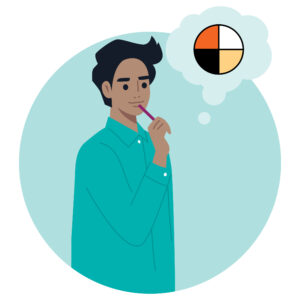
Many Indigenous Peoples in Canada use the Medicine Wheel as a guide to healing.
They think about four types of health:
- Spiritual (nature, Creator or higher power)
- Physical (body systems)
- Emotional (feelings, caring for self and others)
- Mental (learning, goals)
If an area is weak, they work on it proudly. Or they ask for help. The goal is to achieve balance.
How do you feel you are doing in each area? Which area can you work on? Who can help you feel better and more balanced?
Another way to look at healing is to consider healthier lifestyle sciences. These activities release chemicals in the body that make us feel good:
- Walking in nature
- Exercising
- Meditating
- Listening to music
- Dancing
- Laughing
- Working on a fun project
- Spending time with family or friends
How many feel-good activities do you do in a week? Are there any activities you could add?
Talk to someone about your problems
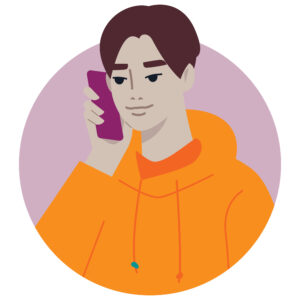
Sometimes things we see, hear and experience make us feel angry, sad or scared. It is normal to have strong feelings for a while. But if those feelings stay with us for a long time, they can hurt us. Talking about what’s wrong can help anyone. It can be difficult to start if you do not do it often.
Many Indigenous Peoples visit an Elder or other trusted adult when they need help. Other people may look to their faith leaders, family or friends for guidance.
In Canada, there are many types of support available to everyone. If you have strong emotions and feel out of control, you can talk to a
- counsellor
- doctor
- support group
Call 2-1-1 or search bc.211.ca to learn about health and social support in your town. Available any time of day or night in 240 languages and dialects. Just say the name of the language you need in English (e.g., “Farsi” or “Cantonese).
If you feel like you want to hurt yourself or someone else…
PAUSE, TAKE A DEEP BREATH, and then
- Call a crisis line:
- In BC, call 310-6789 (7 digits, no area code)
- 1-800-784-2433 (1 800 SUICIDE)
- 9-8-8 Suicide Crisis Helpline (you can phone or send a text message to this number)
- Call 9-1-1
- Go to the hospital
Consider your use of drugs and alcohol
What are you using? How much? How often? Why?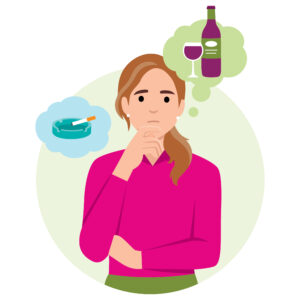
Many people use alcohol and other drugs to help them in their daily lives. These substances can change the way we think, feel and behave.
Some substances are mild, some are strong. Some make us more alert, some slow us down. Some can harm or kill us if we use too much too often.
Commonly used substances in Canada:
- Caffeine (found in coffee, tea, energy drinks, chocolate)
- Nicotine (found in cigarettes, vapes, pipes)
- Alcohol (found in beer, wine, spirits)
- Cannabis (found in buds, edibles)
- Prescription medications (such as pain-killers, antidepressants, sleeping pills)
- Street drugs (such as ecstasy, cocaine, heroin, methamphetamine)
Street drugs are risky to use. They are unregulated. This means the government is not involved in how they are made and distributed. They may be unsafe to use. It is hard to know what is in them or how strong they are. Many people have accidentally died when using street drugs.
If you or someone you love has a problem with alcohol or other substances, find someone to talk to about it. Call the Alcohol and Drug Information Referral Service. Available any time day or night. Available in multiple languages.
- 1-800-663-1441 (toll free anywhere in BC)
- 604 660-9382 (in Metro Vancouver)
Learn more about substances and substance use at heretohelp.bc.ca
Anyone can buy caffeine, but too much is not healthy.
In BC, you must be 19 or older to buy nicotine, alcohol and cannabis. These substances affect different people in different ways. It depends on the person’s age, background and experience. It also depends on the substance type and amount, and the situation.
Only a doctor or nurse practitioner can prescribe medication for depression, anxiety, sleep problems, and so on.
Take care of your mental health
It’s important to take care of our minds. Without a healthy mind, daily life can be hard.
Parents need a healthy mind to care for their children. They need to care about themselves so they can care for their family. Parents and other adults are role models for children and teens.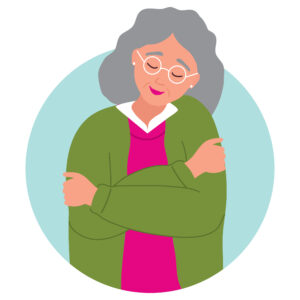
In Canada, many companies encourage workers to take care of their mental health. This includes allowing employees to take time off for mental health reasons or if they are sick. Taking time off will not affect your residency application status. Most companies also offer resources, such as access to a counsellor, as part of their employee benefits. The company does not know which workers use these services.
Many organizations provide staff workshops on ways to adopt healthy practices to help them at work and home.
Tips for feeling better
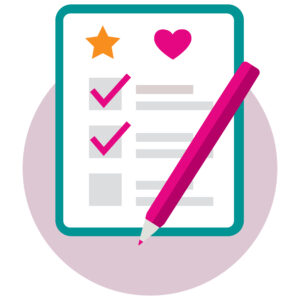 When you feel anger, stress or worry rising in your body, try box breathing. This will help your mind and body come back in balance. Then you can make better decisions.
When you feel anger, stress or worry rising in your body, try box breathing. This will help your mind and body come back in balance. Then you can make better decisions.
Box breathing: Inhale for 4 seconds, hold for 4 seconds, exhale for 4 seconds, and hold for 4 seconds. Repeat several times or until you feel lighter and calmer. If you can, breathe so your belly goes in and out, instead of your ribs. This is a deeper and calmer kind of breathing.
Did you know?
- Eating healthy food more often helps you feel better in your mind too. Eating too much unhealthy food can disrupt your body, emotions and mood.
- Sleep helps your body heal. That’s why it’s important to get enough sleep. But sleeping too much can be a sign that something is wrong.
- Being in nature helps us return to our natural state and help us see things differently. We might get more of a feeling of calm and balance.
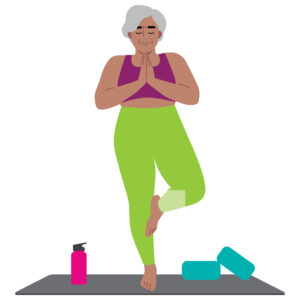
If you have time, meditate, take a short walk, or do a few minutes of light yoga. These release relaxing chemicals in your body. Then think about how to solve a problem.
Socialize. We might want to be alone when not feeling well. But being with other people creates happy chemicals in our bodies. It also reminds us we are not alone in this world and we belong here. Visit a place of worship, join a support group, call a hotline, or visit a free program at a local settlement agency.
Download this booklet as a PDF
- Arabic PDF | Arabic Audio Recording
- Chinese Simplified PDF | Mandarin Audio Recording
- Chinese Traditional PDF | Cantonese Audio Recording
- English PDF
- Hindi PDF | Hindi Audio Recording
- Pashtu PDF | Pashto Audio Recording
- Persian PDF | Persian Audio Recording
- Punjabi PDF | Punjabi Audio Recording
- Spanish PDF | Spanish Audio Recording
- Ukrainian PDF | Ukrainian Audio Recording
These materials were made possible thanks to a grant from the Province of BC.

